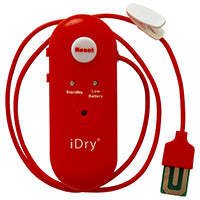
Results in research trials of bedwetting (Enuresis) alarms have varied from 40% success to 97% success. There are several reasons for variability in success rates with bedwetting alarms.
Not waking:
The person requiring the bed wetting solution is expected to wake to the alarm from the start of the programme. Some children/teenagers are such heavy sleepers they will generally not wake to the alarm initially. If this is the case, the responsible adult must listen out for the alarm and go in and wake the child/teenager at the time of the wetting. Eventually the message gets through from their bladder to their brain and they will wake up to the sound of the alarm. Even if the child does wake to the alarm the parent needs to go in as the child will be disoriented. The parent needs to supervise and set up the bed and alarm again and help the child.
Skipping the first steps:
Often the alarm is tried without combining its use with any other strategies. Unless all the factors causing the bedwetting are addressed in a systematic and comprehensive way results can be disappointing and the child may never start to wake to the alarm. The causes are generally a combination of factors including a small bladder, too much urine at night, very deep sleep and constipation. Long term success is much more likely with a program which addresses all these factors. The alarm is only addressing the deep sleep.
Overuse of alarm:
The parents continue using the alarm for months on end until they are despondent and too tired to continue. If the child has not started to improve within two months the alarm should be stopped temporarily. Everyone needs a break. The initial steps of the program should be continued for three months and then the alarm should be tried again, often producing a successful result.
Child wants to leave alarm off:
The child may be frightened by the alarm and refuse to wear it after the first use. If this is the case, rather than stopping the alarm, it can be put on after the child goes to sleep or an alarm with a voice or recording option may be used to bring some fun into the process. These children, who wake easily to the alarm, and are frightened are likely to be cured quite quickly if the alarm is continued. Remember the parent is in charge!
Alarm is not loud enough:
Most alarms are about 85 decibels maximum and although this sound can generally be heard from one end of the house to the other, deep sleepers can sleep straight though this volume of sound. A very loud alarm will wake some children where a softer one will not. Often over time children will start to wake but what is needed is a jolt to the brain that really gets the message through. Our iDry alarm is the loudest alarm in our range with sound levels of 95dB and 110dB. Feedback to us from our customers indicates that parents achieve a quicker result with a very loud alarm.
Hiring a Bedwetting Alarm:
Some Pad and Bell alarms cost about two thousand dollars so these alarms are generally hired because they are too expensive for families to purchase.
Also the alarm pads on these hired alarms need to be disinfected between patients. There is often a waiting period of six to twelve months for hired alarms with a time limit for families to keep the alarm. The bed wetting may appear to have been cured and the alarm is returned to the clinic, however, it is common for relapses to occur within the first 12 months. There may not be an alarm available for hire at the clinic or hospital when it is needed again. If the alarm is not restarted immediately the bed wetting can return and become established again. For the reasons above it is better to purchase a bedwetting alarm. Generally, if the alarm is restarted immediately, the bed wetting will stop again very quickly. We now sell an inexpensive bedwetting alarm which can be used with an underpants sensor or as a pad and bell alarm . The iDry alarm is extremely loud and comes with the DVD program.
See all Bedwetting Alarm and DVD Kits here.

